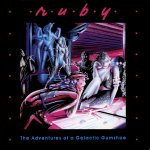Most people don’t realize how much they’ve been penetrated by technology.
Isn't that an interesting concept? We've been penetrated by technology. Like it's living inside of us. And perhaps it is. Gibson pointed out how many vaccinations we receive in childhood: Many of us living 100 years ago would never have reached our fifth birthday.
The future is no longer knowable: In the 1950s, grown-ups planned the future: one positive—rockets to the moon, the world’s fair; one negative—the atomic wasteland.
It seems to me that on the whole, if people even stop to think about the future, they are mostly apathetic. I don't think anyone truly believes in atomic warfare anymore (except maybe Tom Cruise); I don't think a whole lot of people believe in a Star Trek future either (except maybe the die hard Trekkies). The Environment is the new hot topic: Is the world warming or cooling? Reminds me of that Robert Frost poem: Will we end in fire or ice?
It's difficult today to find a non-mediated human.
Again, I love his choice of words. A non-mediated human. We cannot escape it. Media surrounds us and defines our existence. Even if we live our lives in opposition to it, we are still responding to its presence. Daily we are bombarded by images, words. I am often struck by the fact that I read so fast naturally that I have already read a billboard or advertisement before I can look away. I can't even decide not to read it because by the time I look at it it has already penetrated my mind. It reminds me of those science fiction stories where ads are beamed directly into peoples brains as they are walking down the street. I think that this would drive me crazy, but the truth is, it's already happening.
In the 1920s, recordings of music from the Appalachians—people who never heard a recording, or radio—sound fundamentally different.
This concept fascinated me, especially with its ties to music. Culture is constantly influencing culture, but the rate increases exponentially with the introduction of media. We notice, don't we, how quickly new bands influence one another, how scores of them seem to sound the same. We may never have a culture that can produce a band like the Beatles again. I mentioned this in an earlier post, but Gibson surmised that Nirvana may have come out of the last truly creative period. (He says) We no longer have a backwater culture behind the main culture where a movement can gain momentum and grow. Young bands are catapulted too quickly into the spotlight only to flash and burn out in the glare of the paparazzi. Is he right?
Victrola trauma—a preacher who listened to one of the first recordings thought it the voice of the devil. He was experiencing the cusp of change. We don’t find it strange we can hear the voices of the dead whenever we want to.
Not only do we not find it strange, we can go online and download those voices in mere seconds.
The non-mediated world is a lost world. We cannot get back there. There is a sense of loss, but a sense of what we are gaining: Loss and Christmas morning at the same time.
I like the way he phrased that.
Vertiginous moments: we realize the contemporary, experience terror and ecstasy, then retreat from it because we cannot stay in that state of panic. We're more comfortable with who we were 10 years ago.
I love technology, I really do. When it works, when it's beneficial, it can be truly wonderful. Kind of like that comment Harrison Ford makes in Blade Runner: "If it's a benefit, it's not my problem." But I think I agree with Gibson. Even with the best toys, we still experience a certain level of resistance, of discomfort. Well, anyone over 30, that is. I mean, just looking at music as an example, I am far more comfortable with CDs as a medium. I own an iPod, but I haven't completely made my peace with it. I still haven't completely figured out how it works. It frustrates me, so I retreat from it. But I marvel at it all the same.
Subscribe to:
Post Comments (Atom)




1 comment:
Too many things here to comment on. It will have to wait until one of our late night discussions.
Thanks for posting.
Post a Comment